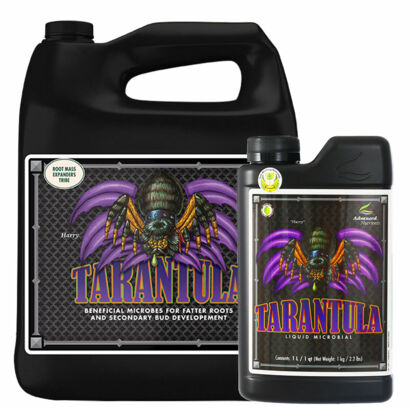Root stimulator Tarantula Liquid
Tarantula Liquid – a highly concentrated mixture of beneficial microorganisms that should be used from the very beginning of plant growth until the second week of the flowering stage. Beneficial microbes are found naturally in the soil; they improve the root system, protecting the plant from diseases and increasing yields.
| Brand | Advanced Nutrients |
| planting material | Rowan, Arugula, Beet, Celery, Plum, Currant, Thyme, tomatoes, Dill, Garlic, Spinach, Sorrel, Apple tree, blackberry, Watermelon, Basil, Eggplant, Sweet potato, Grape, Mustard, Pear, Daikon, Melon, Honeysuckle, Cabbage, Potato, Coriander (cilantro), Strawberry, Watercress, Gooseberry, Lemongrass, Onion, Raspberry, Mint, oats, cucumbers, Paprika, Pepper, Parsley, Rape, Radish, Rosemary |
| Purpose | Stimulant |
| View | Liquid |
| Growing method | Substrates, coco substrate, Hydroponics, The soil |
| Phase | vegetation, root formation, Bloom, Protection |
| Application | Root top dressing |
| Producing country | Canada |
Advanced Nutrients Tarantula Liquid contains 11 super-strains of beneficial microbes, painstakingly bred to create the best environment possible for your plant's roots. The microorganisms in this fertilizer are different from those found in VooDoo Juice, so using the formulations together will produce better results.
Formulated to Advanced Nutrients' stringent quality standards, this fertilizer boosts plant immunity to help fight off root diseases. It increases the mass of the roots and their branching, leading to an increase in yield.
Composition of Tarantula Liquid
Soil organisms – 2%;
- Arthrobacter globiformis – 25.000 cfu/ml;
- bacillus brevis 2.000.000 cfu/ml;
- bacillus coagulans 500.000 cfu/ml;
- bacillus licheniformis 5.000.000 cfu/ml;
- bacillus megaterium 500.000 cfu/ml;
- bacillus polymyxa 50.000 cfu/ml;
- bacillus pumilus 50.000 cfu/ml;
- bacillus subtilis 1.000.000 cfu/ml;
- bacillus thuringiensis 100.000 cfu/ml;
- paenibacillus polymyxa 300.000.
These micro-organisms form colonies around the roots, protecting them from disease by oxygenating and supplying nutrients in an easily digestible form. They also produce organic substances, such as humates, which naturally "chelate" nutrients to ensure maximum absorption of nutrients by the root system.

